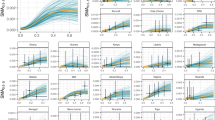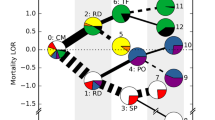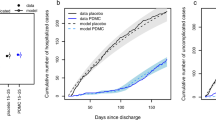Abstract
We have provided an evidence-based framework for estimating the public-health burden of P. falciparum malaria1 by using a uniform series of structured, transparent and reproducible data and methods to define the cartography of this parasite's clinical impact at a global scale. This contribution to global disease modelling is questioned by Nahlen et al.2 for United Nations agencies responsible for measuring development targets (see also ref. 3), and our estimation of the malaria burden outside Africa is challenged by Bell et al.4.
This is a preview of subscription content, access via your institution
Access options
Subscribe to this journal
Receive 51 print issues and online access
$199.00 per year
only $3.90 per issue
Buy this article
- Purchase on Springer Link
- Instant access to full article PDF
Prices may be subject to local taxes which are calculated during checkout
Similar content being viewed by others
References
Snow, R. W., Guerra, C. A., Noor, A. M., Myint, H. Y. & Hay, S. I. Nature 434, 214–217 (2005).
Nahlen, B. L., Korenromp, E. L., Miller, J. & Shibuya, K. doi: 10.1038/nature04178Nature (2005).
Attaran, A. PLoS Med. (in the press).
Bell, D. R., Jorgensen, P., Christophel, E. M. & Palmer, K. L. doi:10.1038/nature04179 Nature (2005).
WHO Expert Committee on Malaria: 20th Report (World Health Organization, Geneva, 2000). http://www.rbm.who.int/docs/ecr20.pdf
World Health Organization A Global Strategy for Malaria Control (WHO, Geneva, 1993).
Murray, C. J. L. & Lopez, A. D. Lancet 349, 1269–1276 (1997).
World Health Organization The World Health Report 1999: Making a Difference — Rolling Back Malaria (WHO, Geneva, 1999).
Hay, S. I., Guerra, C. A. & Snow, R. W. Determination of Populations at Malaria Risk (M50/370/19) for Monitoring and Evaluation Group (MERG), Roll Back Malaria (RBM), World Health Organization (WHO) (WHO, Geneva, 2004).
Korenromp, E. L. for the RBM MERG Task Force on Malaria Morbidity: Malaria Incidence Estimates at Country Level for the Year 2004 — Proposed Estimates and Draft Report (World Health Organization, Roll Back Malaria, Geneva, 2005). http://mosquito.who.int/docs/incidence_estimations2.pdf.
Snow, R. W., Craig, M. H., Newton, C. R. J. C. & Steketee, R. W. The Public Health Burden of Plasmodium falciparum Malaria in Africa: Deriving the Numbers (The Disease Control Priorities Project (DCPP) Working Paper Number 11, Washington DC, 2003). http://www.fic.nih.gov/dcpp
Muller, I., Bockarie, M., Alpers, M. & Smith, T. Trends Parasitol. 19, 253–259 (2003).
Over, M., Bakote'e, B., Velayudhan, R., Wilikai, P. & Graves, P. M. Am. J. Trop. Med. Hyg. 71, 214–223 (2004).
Maitland, K. et al. Trans. R. Soc. Trop. Med. Hyg. 90, 614–620 (1996).
Author information
Authors and Affiliations
Corresponding author
Rights and permissions
About this article
Cite this article
Snow, R., Guerra, C., Noor, A. et al. Estimating clinical episodes of malaria (reply). Nature 437, E4–E5 (2005). https://doi.org/10.1038/nature04180
Published:
Issue Date:
DOI: https://doi.org/10.1038/nature04180
This article is cited by
-
Computational analysis of aspartic protease plasmepsin II complexed with EH58 inhibitor: a QM/MM MD study
Journal of Molecular Modeling (2011)
Comments
By submitting a comment you agree to abide by our Terms and Community Guidelines. If you find something abusive or that does not comply with our terms or guidelines please flag it as inappropriate.



